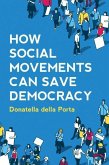At the heart of developed societies lies an insatiable drive for wealth and prosperity. Yet in a world ruled by free-market economics, there are always winners and losers. The benefits enjoyed by the privileged few come at the expense of the many.
In this important new book, Stephan Lessenich shows how our wealth and affluence are built overwhelmingly at the expense of those in less-developed countries and regions of the world. His theory of 'externalization' demonstrates how the negative consequences of our lifestyles are directly transferred onto the world's poorest. From the destruction of habitats caused by the massive increase in demand for soy and palm oil to the catastrophic impact of mining, Lessenich shows how the Global South has borne the brunt of our success. Yet, as we see from the mass movements of people across the world, we can no longer ignore the environmental and social toll of our prosperity.
Lessenich's highly original account of the structureand dynamics of global inequality highlights the devastating consequences of the affluent lifestyles of the West and reminds us of our far-reaching political responsibilities in an increasingly interconnected world.
Hinweis: Dieser Artikel kann nur an eine deutsche Lieferadresse ausgeliefert werden.
In this important new book, Stephan Lessenich shows how our wealth and affluence are built overwhelmingly at the expense of those in less-developed countries and regions of the world. His theory of 'externalization' demonstrates how the negative consequences of our lifestyles are directly transferred onto the world's poorest. From the destruction of habitats caused by the massive increase in demand for soy and palm oil to the catastrophic impact of mining, Lessenich shows how the Global South has borne the brunt of our success. Yet, as we see from the mass movements of people across the world, we can no longer ignore the environmental and social toll of our prosperity.
Lessenich's highly original account of the structureand dynamics of global inequality highlights the devastating consequences of the affluent lifestyles of the West and reminds us of our far-reaching political responsibilities in an increasingly interconnected world.
Hinweis: Dieser Artikel kann nur an eine deutsche Lieferadresse ausgeliefert werden.
'A timely sociological explication of the meaning of globalization in the North: living well at the expense of others.'
Göran Therborn, University of Cambridge, author of Cities of Power and The Killing Fields of Inequality
'Lessenich, a leading German sociologist, has written an important new book on the dynamics of global inequality. His compelling and convincing theory of "externalization" illuminates how the affluent lifestyles and over-consumption of the rich few in the Global North exact their tolls outside its borders - at the expense of the many more in the Global South. This interconnection is not "natural" or "inevitable" but built into the very architecture of the world economy. That it is seemingly invisible to the wealthy birthright winners challenges our moral responsibilities to those left behind.'
Timothy Patrick Moran, co-author of Unveiling Inequality: A World-Historical Perspective
"A disturbing evaluation of global inequality, both a sociological analysis and a moral plea. Lessenich points to an uncomfortable truth in reminding us that the wealth of the few is not merely the result of hard work or economic productivity, but rests decisively on their strategic position in the global economy." Deutschlandfunk
"Stephan Lessenich confronts us with a reality we would prefer to ignore, one that will either force us to change the way we live or weigh on our consciences if we don't."
Frankfurter Rundschau
"This book may make for troubling reading as it sweeps away our illusions, yet at the same time it provides much-needed clarity on key issues. One of the most important books this year."
Süddeutsche Zeitung
"Sets out boldly to confront forgetting"
Times Higher Education
'This important book, by pointing to the deep and systemic nature of our current malaise, might just move us towards the collective, and empathic, action required [for a more just and environmentally sustainable world]. There really is no "us" and "them" any more.'
The Irish Times
Göran Therborn, University of Cambridge, author of Cities of Power and The Killing Fields of Inequality
'Lessenich, a leading German sociologist, has written an important new book on the dynamics of global inequality. His compelling and convincing theory of "externalization" illuminates how the affluent lifestyles and over-consumption of the rich few in the Global North exact their tolls outside its borders - at the expense of the many more in the Global South. This interconnection is not "natural" or "inevitable" but built into the very architecture of the world economy. That it is seemingly invisible to the wealthy birthright winners challenges our moral responsibilities to those left behind.'
Timothy Patrick Moran, co-author of Unveiling Inequality: A World-Historical Perspective
"A disturbing evaluation of global inequality, both a sociological analysis and a moral plea. Lessenich points to an uncomfortable truth in reminding us that the wealth of the few is not merely the result of hard work or economic productivity, but rests decisively on their strategic position in the global economy." Deutschlandfunk
"Stephan Lessenich confronts us with a reality we would prefer to ignore, one that will either force us to change the way we live or weigh on our consciences if we don't."
Frankfurter Rundschau
"This book may make for troubling reading as it sweeps away our illusions, yet at the same time it provides much-needed clarity on key issues. One of the most important books this year."
Süddeutsche Zeitung
"Sets out boldly to confront forgetting"
Times Higher Education
'This important book, by pointing to the deep and systemic nature of our current malaise, might just move us towards the collective, and empathic, action required [for a more just and environmentally sustainable world]. There really is no "us" and "them" any more.'
The Irish Times








